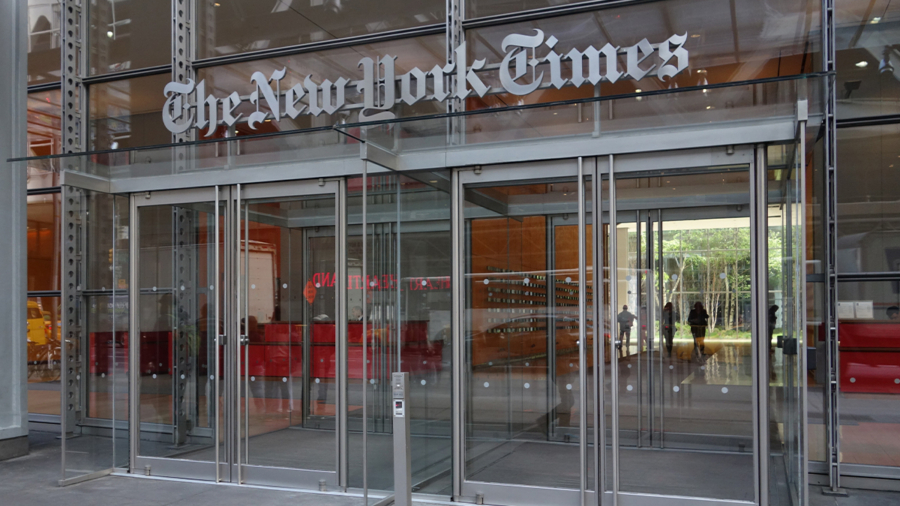The Chinese regime is set to expel U.S. journalists based in China who work for the New York Times, the Wall Street Journal and the Washington Post, in retaliation for the Trump administration’s recent actions targeting Chinese state-run media outlets in the United States.
In early March, the U.S. State Department designated five Chinese state-run outlets as “foreign missions,” and slashed the number of Chinese staff allowed to work at the media outlets’ offices in the United States. An administration official previously labeled those outlets, including Xinhua News Agency and China Global Television Network, as “explicit propaganda organs of the Chinese Communist Party.”
At the time, senior administration officials said such actions were an act of reciprocity against Beijing’s continued use of “intimidation to silence members of a free and independent press.”
Retaliation
In retaliation against the United States for reducing staff sizes at those outlets, the Chinese foreign ministry said in a March 17 statement that it would require all journalists of U.S. citizenship employed at the New York Times, Wall Street Journal, and Washington Post whose press credentials are due to expire before the end of the year to hand back their press cards within 10 days.
“They will not be allowed to continue working as journalists in the People’s Republic of China, including its Hong Kong and Macao Special Administrative Regions,” the statement said.
The ministry also announced that it would require China-based branches of Voice of America, the New York Times, Wall Street Journal, Washington Post and Time magazine to report information about their staff, finances, operations, and real estate property in China. That measure, it said, was in response to the United States designating the five state-run outlets as foreign missions.
The ministry added it would impose “reciprocal measures against American journalists” over “discriminatory restrictions the U.S. has imposed on Chinese journalists with regard to visa, administrative review and reporting,” without providing further detail.
The U.S. State Department and White House did not immediately respond to a request for comment.
Reactions
Marty Baron, executive editor of the Washington Post, said in a statement that the outlet “unequivocally condemn any action by China to expel U.S. reporters.” Amid the current novel coronavirus pandemic, the regime’s decision is “particularly regrettable because it comes in the midst of an unprecedented global crisis, when clear and reliable information about the international response to COVID-19 [disease caused by coronavirus] is essential.”
“Severely limiting the flow of that information, which China now seeks to do, only aggravates the situation,” Baron said.
Suzanne Nossel, CEO of rights group PEN America, also lamented Beijing’s decision.
Secretary of State Pompeo previously said that the measures formed part of the Trump administration’s efforts to establish a “long-overdue level playing field” in its relationship with the Chinese regime.
“For years, the government of the People’s Republic of China has imposed increasingly harsh surveillance, harassment, and intimidation against American and other foreign journalists operating in China,” he said.
While there are hundreds of Chinese nationals working in the media industry in the United States, there are only about 100 U.S. journalists working in China for U.S.-based and other foreign-based media outlets, according to an administration official.
U.S. officials also criticized Beijing for presiding over a “deepening crackdown” on independent journalism within the country. In a March 2 call with journalists, they cited examples such as the disappearance of citizen journalists covering the coronavirus epidemic in Wuhan, and the arrest of Jimmy Lai, founder of Hong Kong-based independent newspaper Apple Daily, in Hong Kong, on charges connected to his participation in the city’s pro-democracy protests last year.
Senator Ben Sasse (R-Neb.), in a statement, said that Chinese leader Xi Jinping is “terrified of a free and independent press because he doesn’t want to be challenged when his government regularly spews insane propaganda like the recent conspiracy theory that the United States created the coronavirus.”
“These thin-skinned communist hacks hate the truth and are committed to covering-up their failures,” Sasse added.
Last month, the regime revoked the visas of three Wall Street Journal reporters in Beijing, citing the newspaper’s refusal to apologize for a “racially discriminatory” headline of an op-ed piece, which had called China the “real sick man of Asia.” Those three reporters were not involved in drafting the op-ed piece.
Another reporter with the paper had to leave last year after Beijing declined to renew his visa.
On March 2, the Foreign Correspondents Club of China (FCCC) said in a report that the Chinese regime has “weaponized” visas as part of an intensifying campaign to suppress independent reporting on issues deemed sensitive by Beijing.
“As China reaches new heights of economic influence, it has shown a growing willingness to use its considerable state power to suppress factual reporting that does not fit with the global image it seeks to present,” the report said.
From The Epoch Times

